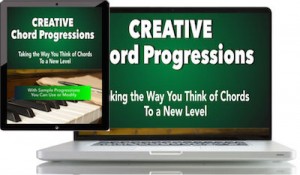Good songwriting happens when someone has an instinct for it. But like anything in the arts (or in anything, come to think of it), great songwriting happens when you build on your innate talents, through study, analysis and practice.
Most people who write songs have at least some level of instinct and talent, because it’s unlikely that someone would have an interest in something for which an instinct is completely lacking.
The problem with talent is that it has a way of fooling you into thinking that you don’t still have things to learn. Moreover, natural talent can also make you feel suspicious of studying: there’s a common myth that studying gets in the way of instinct.
 “Hooks and Riffs: How They Grab Attention, Make Songs Memorable, and Build Your Fan Base.” It’s part of “The Essential Secrets of Songwriting” 10-eBook Bundle. It’s time to really study and discover the most important principles of great songwriting.
“Hooks and Riffs: How They Grab Attention, Make Songs Memorable, and Build Your Fan Base.” It’s part of “The Essential Secrets of Songwriting” 10-eBook Bundle. It’s time to really study and discover the most important principles of great songwriting.
One of the biggest problems that comes from being naturally talented is the formation of bad habits, to the extent that people start to believe their bad habits are actually an asset. The “well, it works for me” opinion can seriously impair a songwriter’s ability to improve and build on their instincts for music.
What bad songwriting habits do you have that you’re currently dealing with? If you say “None!”, take a look at the following short list, and you might find that it’s time to put the magnifying glass on your technique, and work to improve your songwriting process.
1. You only write when the feeling hits you.
There’s an important aspect of discipline that comes from scheduling your songwriting activities. If you only ever write because a great idea suddenly hits you, you are missing out. Scheduling your songwriting means writing when you don’t think you have anything in your musical brain to write.
When you do that, you’re usually in for a pleasant surprise. You discover that your brain can formulate great musical ideas even when you think you’re at a low ebb. The kind of discipline that comes from a writing schedule is a vital part of bumping yourself up into the world of the songwriting professionals.
2. You don’t explore new songwriting processes.
Do you find yourself starting each and every song the same way? Perhaps vamping a few chords, or always playing the same instrument? Explore as many new and different ways to initiate the songwriting process as you can. Try guitar, piano, mandolin, your old high school flute, your uncle’s fiddle, and so on.
You don’t need to be good at an instrument to get melodic ideas. But sticking to the same old instrument all the time locks you into a kind of muscle memory that works against musical innovation.
3. You don’t seek out partnerships with other musicians.
If for you songwriting is always a solitary event, where you never incorporate the ideas of someone else, you could be missing an enormous opportunity of expanding your musical palate. Find times to connect with other good musicians.
Remember that they don’t even need to be songwriters, per se. Just sitting down with a good guitarist and improvising some melodies over a chord progression that they’ve come up with, and then hearing them “respond” to those ideas, can open your musical mind in important ways.
4. You aren’t actively trying to expand your musical tastes.
Anyone can listen to the music they love, but have you ever tried to listen to genres that you’ve previously sworn off? You may hate country, for example, but there are many great songwriters and bands who are pushing the boundaries of that (and every) genre.
So take the time to do an online search for “best country hits”, “best metal songs ever”, “best bluegrass”, and so on. As you experience other genres, you’ll find your own personal definition of what good music is will get nudged in different directions. And that’s always a good thing.
5. You aren’t getting your songs “out there.”
These days, it’s so easy to use your computer to write songs. The advantage is that you can be your own producer and distributor. The disadvantage is also that you can be your own producer and distributor.
Getting your songs “out there” means not just streaming them on the internet, but also getting out there yourself, and playing your music wherever it’s appropriate to do so. For some of you, that’ll be a café. For others, it might be some sort of larger venue. But songwriting from your bedroom, though it may seem convenient, puts you in a musical vacuum that you’d do well to avoid. Get out there, and put a face on your songs!
Any one of these bad habits are relatively easy to fix, even if (as in the case of the last one) the fix may take some time. And don’t forget to study the music of great musicians. Listen to a lot of music, read books, interviews, always try to figure out why great songs are great.
Written by Gary Ewer. Follow Gary on Twitter.

“The Essential Secrets of Songwriting” eBook Bundle packages explore 11 principles of songwriting, and will take your own music to a new level of excellence. Right now, download a FREE COPY of “Creative Chord Progressions”, when you get the 10-ebook Bundle.











I have a question about “getting your songs out there and putting a face on your music.
My boyfriend is the singer and musician part of our partnership. Last year he developed an abscess in his lung (now healed) but still can’t sing more than a couple songs at a time any more. Though he sang and played live 35 plus years, he can’t do that now.
Do you have any suggestions for us. We have a music website, put a few of our songs on Radioplay, are making music videos for Youtube, and also submit songs for possible licensing on Broadjam. Under our circumstance, what else can we do? We can’t move to a “music” town where publishers and AR people are available.
Thank you for any suggestions you can come up with.
Hi Linda:
It sounds to me as though you are already doing the things that you should be doing. You’re recording your songs, making them easily available for others to listen to, and you’re (I assume) still writing new songs. Moving to a music town is not usually necessary, as long as it’s easy for you to provide new music to your friends and followers, and if you’re maintaining a good, professional-looking website.
When it comes to live performance, that’s when your boyfriend’s condition will be the biggest problem, since he will only be able to sing 1 or 2 songs at a time. If live music is something you want to keep in your life, I might recommend bringing other musicians into your act, ones who can also sing. That would take the pressure off your boyfriend to be the only singer in your group.
I wish you great success, Linda. It sounds like you’ve got the diligence and determination to make music work for you!
-Gary
Thank you so much for your response. Sometimes it’s difficult to keep hoping something good will happen with our music when not much is. Your encouragement has been a big help to me. Marty is ever positive and hopeful, but sometimes not me. I’m new to the music business and have been writing songs for only a couple years. Patience, patience. We just have to keep working at it.
Pingback: Gary Ewer – How Talent and Instinct Can Get In the Way of Good Songwriting — The Essential Secrets of Songwriting | I Write The Music
Pingback: How Talent and Instinct Can Get In the Way of Good Songwriting - The Hit Songwriting Formula | The Hit Songwriting Formula